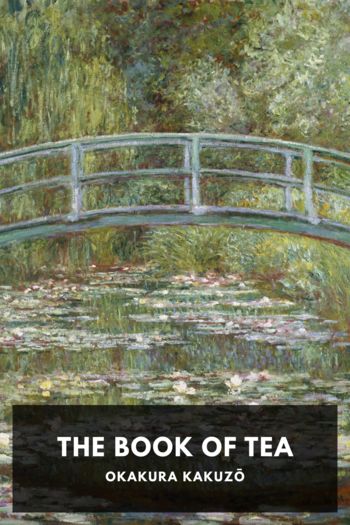The Book of Tea Okakura Kakuzō (i like reading books TXT) 📖

- Author: Okakura Kakuzō
Book online «The Book of Tea Okakura Kakuzō (i like reading books TXT) 📖». Author Okakura Kakuzō
The sympathetic communion of minds necessary for art appreciation must be based on mutual concession. The spectator must cultivate the proper attitude for receiving the message, as the artist must know how to impart it. The tea-master, Kobori-Enshiu, himself a daimyo, has left to us these memorable words: “Approach a great painting as thou wouldst approach a great prince.” In order to understand a masterpiece, you must lay yourself low before it and await with bated breath its least utterance. An eminent Sung critic once made a charming confession. Said he: “In my young days I praised the master whose pictures I liked, but as my judgement matured I praised myself for liking what the masters had chosen to have me like.” It is to be deplored that so few of us really take pains to study the moods of the masters. In our stubborn ignorance we refuse to render them this simple courtesy, and thus often miss the rich repast of beauty spread before our very eyes. A master has always something to offer, while we go hungry solely because of our own lack of appreciation.
To the sympathetic a masterpiece becomes a living reality towards which we feel drawn in bonds of comradeship. The masters are immortal, for their loves and fears live in us over and over again. It is rather the soul than the hand, the man than the technique, which appeals to us—the more human the call the deeper is our response. It is because of this secret understanding between the master and ourselves that in poetry or romance we suffer and rejoice with the hero and heroine. Chikamatsu, our Japanese Shakespeare, has laid down as one of the first principles of dramatic composition the importance of taking the audience into the confidence of the author. Several of his pupils submitted plays for his approval, but only one of the pieces appealed to him. It was a play somewhat resembling the Comedy of Errors, in which twin brethren suffer through mistaken identity. “This,” said Chikamatsu, “has the proper spirit of the drama, for it takes the audience into consideration. The public is permitted to know more than the actors. It knows where the mistake lies, and pities the poor figures on the board who innocently rush to their fate.”
The great masters both of the East and the West never forgot the value of suggestion as a means for taking the spectator into their confidence. Who can contemplate a masterpiece without being awed by the immense vista of thought presented to our consideration? How familiar and sympathetic are they all; how cold in contrast the modern commonplaces! In the former we feel the warm outpouring of a man’s heart; in the latter only a formal salute. Engrossed in his technique, the modern rarely rises above himself. Like the musicians who vainly invoked the Lungmen harp, he sings only of himself. His works may be nearer science, but are further from humanity. We have an old saying in Japan that a woman cannot love a man who is truly vain, for their is no crevice in his heart for love to enter and fill up. In art vanity is equally fatal to sympathetic feeling, whether on the part of the artist or the public.
Nothing is more hallowing than the union of kindred spirits in art. At the moment of meeting, the art lover transcends himself. At once he is and is not. He catches a glimpse of Infinity, but words cannot voice his delight, for the eye has no tongue. Freed from the fetters of matter, his spirit moves in the rhythm of things. It is thus that art becomes akin to religion and ennobles mankind. It is this which makes a masterpiece something sacred. In the old days the veneration in which the Japanese held the work of the great artist was intense. The tea-masters guarded their treasures with religious secrecy, and it was often necessary to open a whole series of boxes, one within another, before reaching the shrine itself—the silken wrapping within whose soft folds lay the holy of holies. Rarely was the object exposed to view, and then only to the initiated.
At the time when Teaism was in the ascendency the Taiko’s generals would be better satisfied with the present of a rare work of art than a large grant of territory as a reward of victory. Many of our favourite dramas are based on the loss and recovery of a noted masterpiece. For instance, in one play the palace of Lord Hosokawa, in which was preserved the celebrated painting of Dharuma by Sesson, suddenly takes fire through the negligence of the samurai in charge. Resolved at all hazards to rescue the precious painting, he rushes into the burning building and seizes the kakemono, only to find all means of exit cut off by the flames. Thinking only of the picture, he slashes open his body with his sword, wraps his torn sleeve about the Sesson and plunges it into the gaping wound. The fire is at last extinguished. Among the smoking embers is found a half-consumed corpse, within which reposes the treasure uninjured by the fire. Horrible as such tales are, they illustrate the great value that we set upon a masterpiece, as well as the devotion of a trusted samurai.
We must remember, however, that art is of value only to the extent that it speaks to us. It might be a universal language if we ourselves





Comments (0)